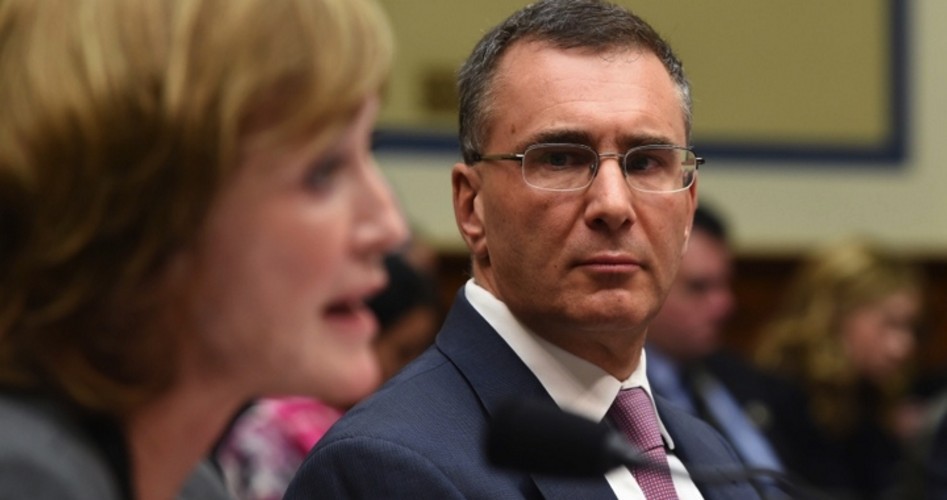Inside Track
Gruber, Tavenner Answer to Congress for ObamaCare Controversies
Gruber is answering for a video of his appearance at a panel hosted by the Penn Leonard Davis Institute of Health Economics on October 17, 2013, that only recently went viral. It was on that panel that he admitted that though the individual mandate was upheld by the Supreme Court because it was perceived as a tax, it is in fact not a tax. He explained,
This bill was written in a tortured way to make sure CBO [the Congressional Budget Office] did not score the mandate as taxes. If CBO scored the mandate as taxes, the bill dies.
Lack of transparency is a huge political advantage. And basically, call it the stupidity of the American voter or whatever, but basically that was really, really critical for the thing to pass.
In terms of risk rated subsidies, if you had a law which said that healthy people are going to pay in — you made explicit healthy people pay in and sick people get money, it would not have passed.
He added that he wished the legislation could have been written in a transparent way, but that he’d “rather have this law than not.”
Appearing before the House Oversight and Government Reform Committee, Gruber was questioned by the committee’s chairman, Representative Darrell Issa (R-Calif.), who had recently told Reuters that the public deserves an explanation from Gruber for his statements. Issa called the healthcare law "the poster child for this administration's broken transparency promises."
Gruber responded by saying that he does not in fact believe that the bill was passed in a “non-transparent fashion.”
Issa told Gruber, "You made a series of troubling statements that were not only an insult to the American people, but revealed a pattern of intentional misleading [of] the public about the true impact and nature of ObamaCare."
During Tuesday’s hearing, Gruber profusely apologized for his comments and admitted they were both “mean and insulting," as well as “glib, thoughtless and sometimes downright insulting.”
"I sincerely apologize for conjecturing with a tone of expertise and for doing so in such a disparaging fashion," Gruber said. "I knew better. I know better. I'm embarrassed and I'm sorry."
In an effort to defend the healthcare law, Gruber said that his own “inexcusable arrogance is not a flaw in the Affordable Care Act.”
The ranking Democrat on the committee, Representative Elijah Cummings of Maryland, said he was also angry with Gruber for giving Republicans a "public relations gift." "As far as I can see, we're here today to beat up on Jonathan Gruber for stupid — I mean absolutely stupid — comments he's made over the past few years. This may be good political theater, but it will not help a single person get health insurance," Cummings said.
Also appearing at the hearing was Marilyn Tavenner, administrator of the Centers for Medicare and Medicaid Services (CMS). In an effort to distance herself from Gruber's remarks, Tavenner had requested that she appear on a different witness panel from his.
The Department of Health and Human Services submitted a letter — obtained by Politico — reiterating Tavenner’s request to be seated separately from Gruber. “I am writing to reiterate the request made to your staff regarding the structure of the hearing; that is, that Administrator Tavenner be provided the opportunity to testify on a panel comprised solely of government witnesses,” wrote Jim Esquea, assistant secretary for legislation at HHS. “Executive Branch officials are almost always afforded an opportunity to testify on a panel either alone or with other government witnesses.”
Despite Tavenner’s request, however, she appeared side by side with Gruber on the same panel during Tuesday’s hearing. “We think you’re right to be there. In fact, we think this is a perfect pairing,” Issa told Tavenner on Tuesday.
At the hearing, Issa also slammed the CMS for allegedly inflating their enrollment numbers. The agency initially claimed enrollment of 7.3 million, but later revised that down to 6.7 million. Issa suggested this was an attempt to "doctor the books."
He also scolded Tavenner for failing to provide documents that explain why CMS chose to include 400,000 dental plans in the enrollment tally. “It’s about honesty and transparency for the American people,” Issa declared.
Tavenner defended the inaccurate enrollment tally. "Simply put, this was a mistake," she insisted. "While this mistake was regrettable, it shouldn't obscure the fact that the Affordable Care Act is working. We have seen a dramatic decrease in the number of uninsured Americans and exceptionally low growth across a wide variety of measures of health care costs."
The Obama administration has gone through painstaking efforts to distance itself from Gruber and his controversial statements. On numerous occasions, the president and his fellow Democrats have attempted to argue that Gruber did not play a significant role in writing ObamaCare. Obama said when he was in Australia, “The fact that some adviser who never worked on our staff expressed an opinion that I completely disagree with in terms of the voters is no reflection on the actual process that was run."
But those remarks were quickly undermined by the release of yet another video, featuring Obama admitting that he has “stolen ideas” from Gruber, rather “liberally.” In the video, the president said:
You have already drawn some of the brightest minds from academia and policy circles, many of them I have stolen ideas from liberally, people ranging from Robert Gordon to Austan Goolsbee; Jon Gruber.
And during President Obama’s first campaign in 2006, Gruber reportedly advised Obama, and has visited the White House at least a dozen times since he’s taken office. Furthermore, Gruber received a contract of approximately $400,000 to advise the president on the healthcare law.
Likewise, in 2012, after a debate with Mitt Romney, the Obama campaign produced a press release that labelled Gruber as an architect of ObamaCare. The move was intended to undermine Romney’s anti-ObamaCare statements as Gruber had also worked for the Romney administration; however, it is likely that Obama never thought that press release would come back to hurt him years later.
Additionally, Gruber was prominently featured in an Obama campaign commercial in 2012, wherein lines were drawn between Romney’s healthcare plan and Obama’s, as Gruber was the “health consultant” for both.
Gruber himself has endeavored to downplay his role in the design of ObamaCare, insisting that he was not a political advisor but instead developed a "complex economic microsimulation model" to evaluate the costs and benefits of healthcare policy changes.
The intentional political deception that went into the design of ObamaCare, as well as Obama’s attempts to deceive the American people about Gruber’s role in the legislation, and the inflated enrollment figures, have renewed Republican concerns over the healthcare law.
Rep. Issa added a question about Gruber: "If you can't trust what he says, and what he says he'll do, to get votes and trick the American people into voting for something, then can you trust his analytics?"
Photo of Jonathon Gruber and Marilyn Tavenner: AP Images


